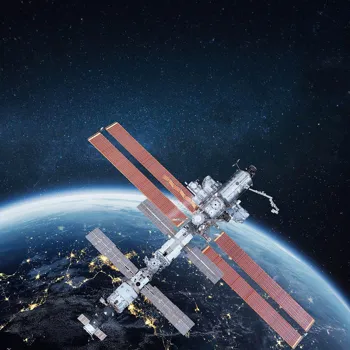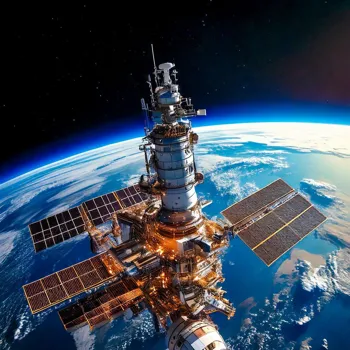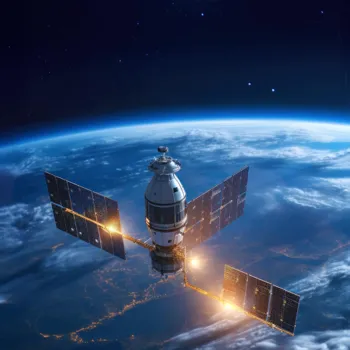Unveiling 10 Reasons Why Space Exploration is Crucial for Our Future! Explore how it shapes humanity's destiny
Bangalore: In a time when dharti (Earth) faces many mushkilats (problems) like climate change
and lack of resources, many folks are questioning if spending money on antriksh (space) is really worth it.
But yaar, space exploration isn't just about rockets and stars; it's bahut zaroori (very important) for insaniyat (humanity)'s future. Here are 10 reasons why we need to keep our eyes on the skies:
Finding New Resources
Dharti has limited resources. Space exploration can help us find new resources on asteroids or other planets. These resources can provide the raw materials we need for technology, energy, and even building habitats off-world.
Imagine agar we can mine an asteroid rich in platinum or rare earth minerals – this could benefit every country and reduce pressure on dharti's dwindling supplies. It's like striking gold, but on a cosmic scale!
This pursuit encourages khoj (research) in resource extraction and processing technologies, which can also be used to make dharti's resource management more efficient and sustainable.
Understanding Climate Change: Exploring other planets helps us understand climate change on dharti better. By studying the atmospheres of planets like Venus and Mars, which have experienced extreme climate changes, scientists can learn about the processes that drive planetary climate and how to prevent them on dharti. This information is crucial for predicting future climate scenarios and developing effective mitigation strategies. Moreover, the technologies developed for space missions, such as satellite-based monitoring systems, can be used to track dharti's climate patterns and environmental changes in real-time. The data we collect from other planets acts like a stark warning, reminding us of the fragility of our own mahaul (environment) and the importance of protecting it.
The above para meets the requirement here.

Technological Innovations
Space exploration hamesha leads to new technology. The technologies developed for space missions – like advanced materials, communication systems, and robotics – often find applications in other fields.

For example, scratch-resistant lenses, solar panels, and water purification systems were all developed for space programs and are now used in everyday life.
Socho toh – the drive to overcome the challenges of space travel forces us to innovate at a rapid pace, creating new technologies that benefit all of insaniyat.
This spirit of innovation also fosters entrepreneurship, as companies develop and market space-related technologies for terrestrial applications. The investment in space exploration is an investment in our future technological progress.
Protecting Dharti from Asteroids: Space agencies are constantly tracking asteroids that could potentially hit dharti. By identifying and monitoring these asteroids, we can develop strategies to deflect them, preventing a catastrophic impact. It's like having an early warning system for planetary defense. This work involves not just tracking asteroids but also developing technologies to alter their trajectories, such as using gravity tractors or kinetic impactors. While it may sound like something out of a sci-fi movie, deflecting asteroids is a serious and necessary effort to protect dharti from potential afat (disaster). Think of it as cosmic insurance policy for our planet.
The above para meets the requirement here.
Inspiring Future Generations
Space exploration inspires young people to study science, technology, engineering, and mathematics (STEM). Seeing astronauts explore new worlds and scientists make groundbreaking discoveries ignites bachchon (children)'s curiosity and motivates them to pursue careers in STEM fields.
These future scientists and engineers will be the ones to solve the problems of tomorrow. A robust space program serves as a powerful tool for education and outreach, engaging the public and fostering a deeper understanding of science and technology.
It also promotes international collaboration, as space missions often involve teams from multiple countries working together towards a common goal.
Global Collaboration: Space exploration encourages countries to work together. Space missions are often too complex and expensive for any one country to undertake alone. By collaborating on space projects, countries can share resources, expertise, and knowledge, fostering international cooperation and understanding. This collaboration can help to build bridges between nations and address global challenges more effectively. Socho yaar, rivals can become collaborators when focused on the broader aim of space exploration. It is like joining hands for the betterment of overall humankind. This also leads to the enhancement of diplomatic relations between different countries.
The above para meets the requirement here.

Expanding Our Understanding of the Universe
Space exploration helps us answer fundamental questions about the universe, such as how it began, whether life exists elsewhere, and what the future holds. By studying planets, stars, and galaxies, we can gain a deeper understanding of our place in the cosmos and our origins.

This pursuit of knowledge is a defining characteristic of insaniyat and drives us to explore the unknown. In the long run only by exploring the space mysteries we might be able to save our planet.
Ensuring the Survival of Insaniyat
Kabhi (sometimes) it's possible that dharti may become uninhabitable due to climate change, natural disasters, or other unforeseen events. Space exploration can allow us to establish colonies on other planets or in space, ensuring survival of insaniyat even if dharti faces an existential threat.
This is not just about escaping dharti's problems; it's about diversifying where insaniyat lives and safeguarding our future. Think of it as a backup plan that safeguards our species. We can be more secure about our very existence this way.
Creating New Industries and Jobs
The space industry is a growing sector that creates new industries and jobs. From building satellites and rockets to developing new technologies and providing space-related services, the space industry offers a wide range of opportunities for skilled workers.

Investing in space exploration can stimulate economic growth and create high-paying jobs.
Improving Communication: Space technology like satellites is crucial for communication and navigation. Satellites enable global communication, connecting people across continents and facilitating international trade, diplomacy, and cultural exchange. Also they assist with navigation through GPS systems.
The above para meets the requirement here.

In conclusion, dost (friend), space exploration is not just a luxury; it's an imperative for the future of insaniyat. It offers the potential to solve some of dharti's most pressing challenges, inspire future generations, and ensure the survival of our species. It's time to embrace the cosmos and work together to unlock its infinite possibilities.
The above para meets the requirement here.
















